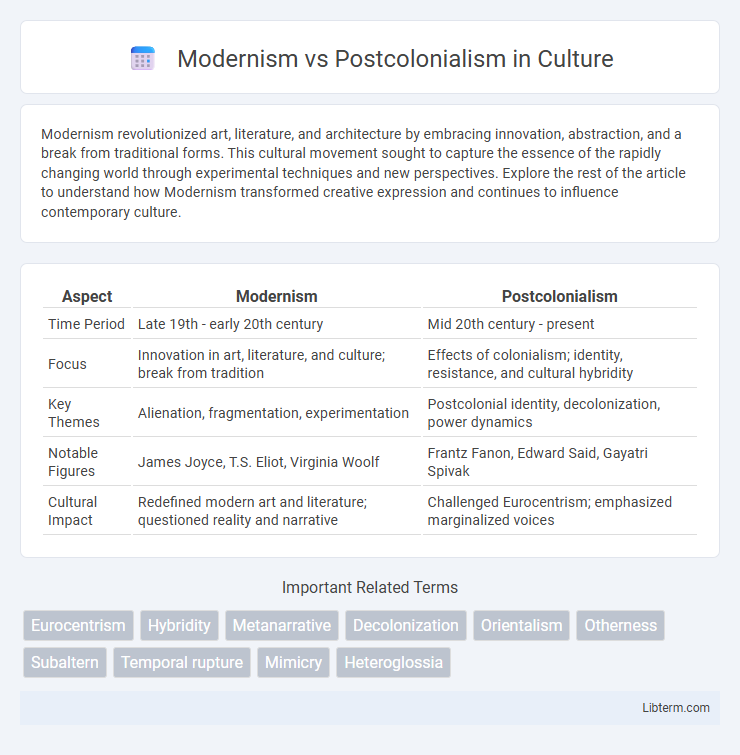Modernism revolutionized art, literature, and architecture by embracing innovation, abstraction, and a break from traditional forms. This cultural movement sought to capture the essence of the rapidly changing world through experimental techniques and new perspectives. Explore the rest of the article to understand how Modernism transformed creative expression and continues to influence contemporary culture.
Table of Comparison
| Aspect | Modernism | Postcolonialism |
|---|---|---|
| Time Period | Late 19th - early 20th century | Mid 20th century - present |
| Focus | Innovation in art, literature, and culture; break from tradition | Effects of colonialism; identity, resistance, and cultural hybridity |
| Key Themes | Alienation, fragmentation, experimentation | Postcolonial identity, decolonization, power dynamics |
| Notable Figures | James Joyce, T.S. Eliot, Virginia Woolf | Frantz Fanon, Edward Said, Gayatri Spivak |
| Cultural Impact | Redefined modern art and literature; questioned reality and narrative | Challenged Eurocentrism; emphasized marginalized voices |
Defining Modernism and Postcolonialism
Modernism represents a literary and cultural movement emerging in the late 19th and early 20th centuries, characterized by a break with traditional forms, experimental techniques, and a focus on subjective experience and fragmented realities. Postcolonialism, developing primarily in the mid-20th century, critically examines the cultural, political, and historical impacts of colonialism and imperialism, emphasizing issues of identity, power, and resistance in formerly colonized societies. Both frameworks interrogate historical narratives and authority but diverge in their temporal focus and thematic concerns, with Modernism centered on aesthetic innovation and Postcolonialism on decolonization and cultural reclamation.
Historical Context: Origins and Evolution
Modernism emerged in the late 19th and early 20th centuries as a response to rapid industrialization and the disillusionment of World War I, characterized by a break from traditional forms in art, literature, and culture. Postcolonialism arose mid-20th century as a critical framework analyzing the aftermath of European colonialism, focusing on identity, power dynamics, and cultural resistance in formerly colonized societies. The evolution of Modernism reflects the search for new aesthetic expressions during modernization, whereas Postcolonialism evolves from decolonization struggles and efforts to reclaim indigenous narratives and histories.
Key Themes and Concerns
Modernism explores themes of fragmentation, alienation, and the search for meaning amidst rapid industrialization and social change, emphasizing individual experience and experimental narrative forms. Postcolonialism centers on identity, power dynamics, and cultural hybridity, critically addressing colonial legacies and the struggle for political and psychological decolonization. Both movements interrogate authority and representation but prioritize different historical contexts and objectives in their examination of culture and society.
Major Works and Authors
Modernism features key works such as James Joyce's *Ulysses* and T.S. Eliot's *The Waste Land*, emphasizing experimental narrative techniques and fragmented perspectives. Postcolonialism includes influential texts like Chinua Achebe's *Things Fall Apart* and Frantz Fanon's *The Wretched of the Earth*, highlighting themes of colonial resistance and identity reconstruction. Both movements critically engage with historical and cultural contexts but diverge in focus, with Modernism centered on individual consciousness and Postcolonialism on socio-political liberation.
Literary Techniques and Styles
Modernism employs fragmented narratives, stream of consciousness, and unreliable narrators to explore subjective reality and inner consciousness, emphasizing alienation and existentialism. Postcolonialism utilizes hybridity, code-switching, and subaltern voices to challenge colonial narratives, foregrounding identity, displacement, and cultural resistance. Both movements disrupt traditional storytelling but diverge in focus: Modernism interrogates individual psyche, while Postcolonialism critiques historical power structures and cultural hegemony.
The Role of Identity and Culture
Modernism emphasizes fragmented identities and the search for universal truths through abstract forms, while postcolonialism foregrounds the reclamation of cultural identity and critiques colonial narratives that erased indigenous voices. Postcolonial theory explores hybridity, displacement, and the negotiation of identity in formerly colonized societies, challenging the Eurocentric perspectives prevalent in modernist literature. The role of identity and culture in postcolonialism prioritizes historical context and power dynamics, reshaping literary expression to reflect pluralistic and marginalized experiences.
Power, Authority, and Resistance
Modernism critiques traditional power structures through fragmented narratives and subjective perspectives, exposing the instability of authority in cultural and political contexts. Postcolonialism interrogates colonial power dynamics by highlighting the ongoing resistance of marginalized identities against imperial dominance and cultural hegemony. Both frameworks emphasize the contestation of authority, with Modernism exploring psychological and aesthetic dimensions while Postcolonialism foregrounds historical and socio-political struggles for autonomy and identity.
Critiques and Contradictions
Modernism faces critiques for its Eurocentric narratives and perceived universalism that often marginalize non-Western voices, while Postcolonialism challenges these perspectives by highlighting the legacy of colonial power dynamics and cultural hybridity. Contradictions arise as Modernism's call for originality clashes with Postcolonialism's emphasis on historical context and the ongoing impact of imperialism. Both frameworks grapple with issues of identity, representation, and authority, but Postcolonialism foregrounds the deconstruction of colonial ideologies embedded in Modernist thought.
Modernism and Postcolonialism in Global Perspective
Modernism in a global perspective emphasizes the break with traditional forms, advocating for innovation and experimentation in literature, art, and architecture, reflecting the complexities of rapidly changing societies. Postcolonialism critiques Modernism by addressing the cultural, political, and historical impacts of colonialism, highlighting marginalized voices and challenging dominant Western narratives. Both movements intersect through their focus on identity, power, and resistance, shaping global discourses on modernity and cultural representation.
Lasting Influence and Contemporary Relevance
Modernism's lasting influence lies in its radical break from tradition, emphasizing individualism, abstraction, and new narrative techniques, which continue to shape contemporary literature and art globally. Postcolonialism's enduring relevance stems from its critical examination of colonial power structures, cultural identity, and resistance, offering vital perspectives on globalization and multicultural societies today. Both frameworks inform academic discourse and creative expression, with Modernism providing formal innovation and Postcolonialism driving sociopolitical consciousness.
Modernism Infographic

 libterm.com
libterm.com